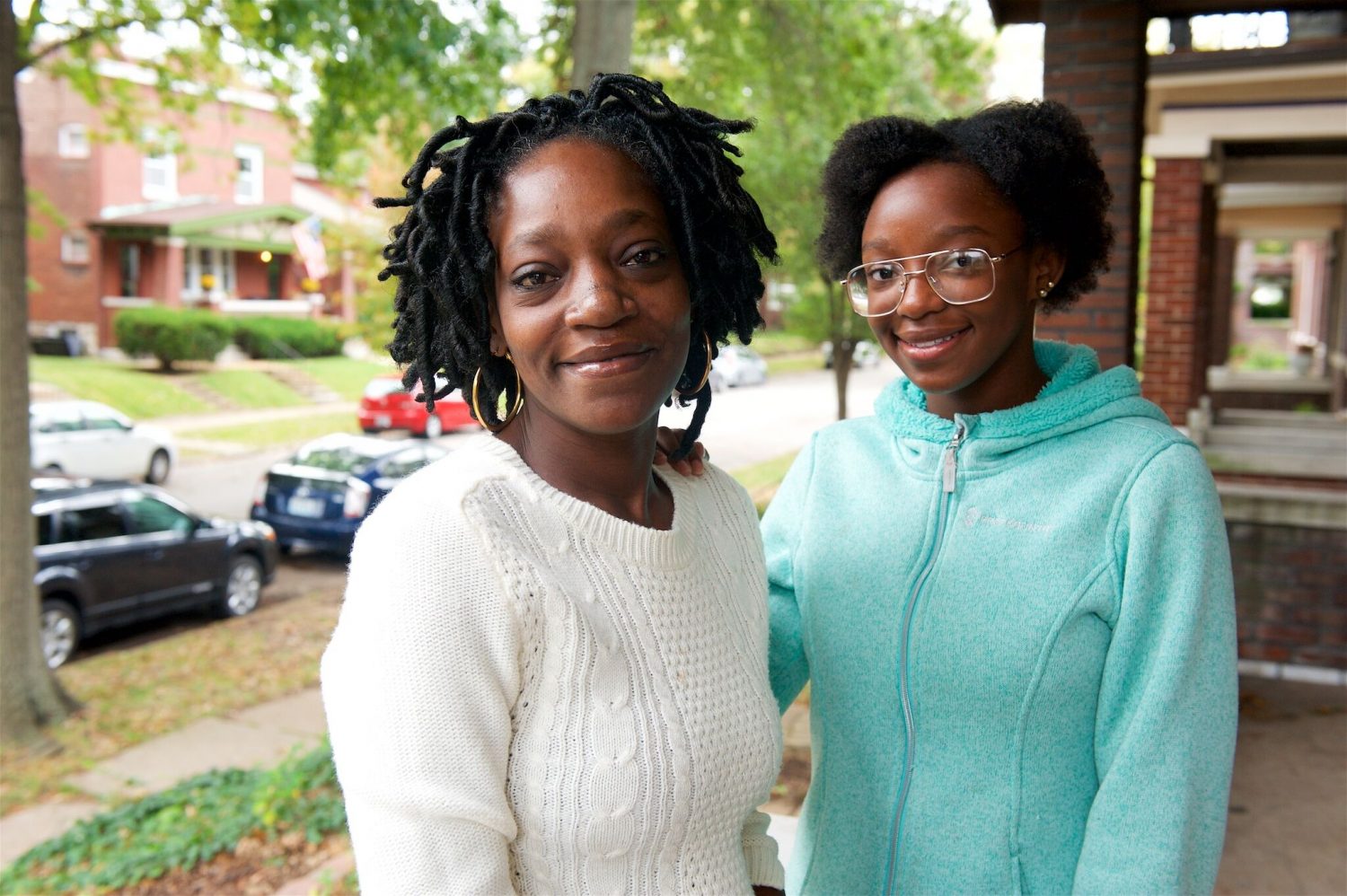A Little Sister with Big Responsibilities: Youth caregiving, and support, #IRL
“I’m Synmar Jeromica Johnson. I am currently 13 years old, but my birthday's coming up. I go to Marian Middle School. I love sports, including track, basketball, and volleyball. I'm going to Nerinx Hall when I graduate. And, um… I'm a very hardworking and a very kind, loving person.”
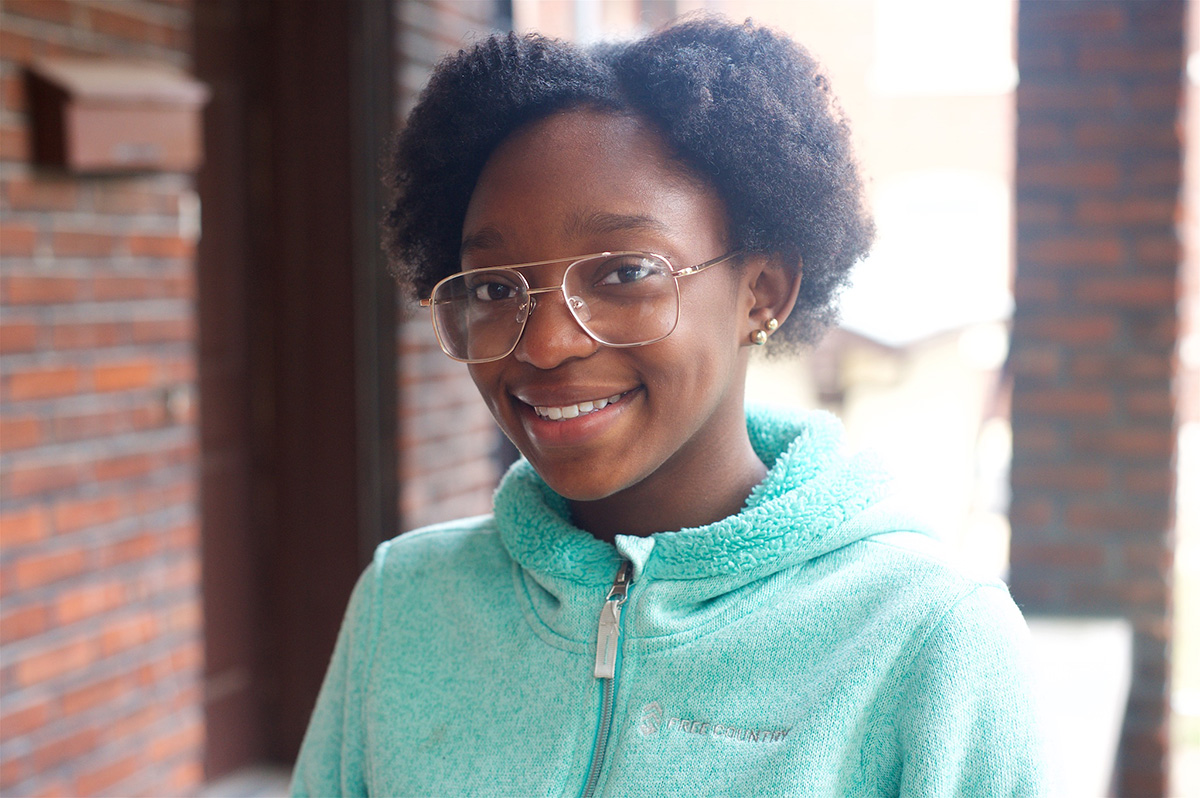
Little Sister Synmar / Photos by Humans of St. Louis
In addition to the above, here are some other facts about Little Sister Synmar: she excels in math and science, runs a mean 400-meter dash, and dreams of trekking the globe as a pediatrician “helping kids that don’t have the proper health care,” she says.
This fall, she will take her next steps towards attaining her career goal by starting high-school at a selective all-girls Catholic school in Webster Groves. There is no doubt that Synmar will stand out among classmates on personality alone. (How many see themselves most in SpongeBob SquarePants? “He makes other people happy even if they find him annoying,” she explains. “And also, he's not normal… but he's still himself and likes being himself even if he's square.”)
But there’s at least one thing more that will set Synmar apart, a thing very intimately tied to another dream: to go to the mall with her mom, Kimmie.

This Mental Health America (MHA) infographic presents caregiving statistics that include numbers and tips applicable to youth caregivers (or "young carers"), ages 8-17.
Like an estimated 1.4 million young people across the United States, Synmar is a youth caregiver – one among a population of young people, ages 8-18, who provide various critical supports to a parent, sibling, or close family member with significant health challenges. Young caregivers are relatively unseen, understudied, and under-served in this country; in fact, the American Association of Caregiving Youth (AACY) is currently the only U.S.-based organization devoted to supporting minors who perform care work. (Comparatively, the UK has over 300 such entities.)
Connie Siskowski, RN, Ph.D., is President and founder of AACY, a nonprofit headquartered in Boca Raton, FL. Siskowski has been doing this work since the mid-2000's and attributes a persisting lack of awareness about youth caregiving to how little the general public understands about the phenomenon.
“Youth caregivers do both daily and instrumental activities of daily living. That includes all kinds of medical treatment and care at home – things like bathing, feeding, dressing, helping with mobility, administering medications, cooking, and all types of household chores. They also provide emotional support and worry about their family members when they are at school - just like adults worry when they are at work,” says Dr. Siskowski. “So it’s really the same as an adult caregiver, in a smaller body.”
In Synmar’s case, day-to-day duties don’t involve meal prep, tracking dosages, or keeping an eye on siblings or elderly relatives the way it can for other young caregivers. Her mother Kimmie struggles with agoraphobia, PTSD, and fibromyalgia among several other health conditions, so Synmar handles tasks that require going into crowded public spaces – the grocery store, for instance – and takes on physically-demanding chores like doing laundry and taking out the trash.
Synmar has also made detailed observations for Kimmie’s healthcare providers. “About a month or so ago, my mom was having these episodes where she would be awake but not, like, coherent,” Synmar says. “I wrote a letter to the doctor explaining what I see when those episodes happen, and how I feel and what I tried to do to help.”
Kimmie’s complex personal and mental health history makes emotional support the biggest contribution Synmar makes to her mother’s well-being. That in turn makes support for Synmar critical, especially at this point in her development.
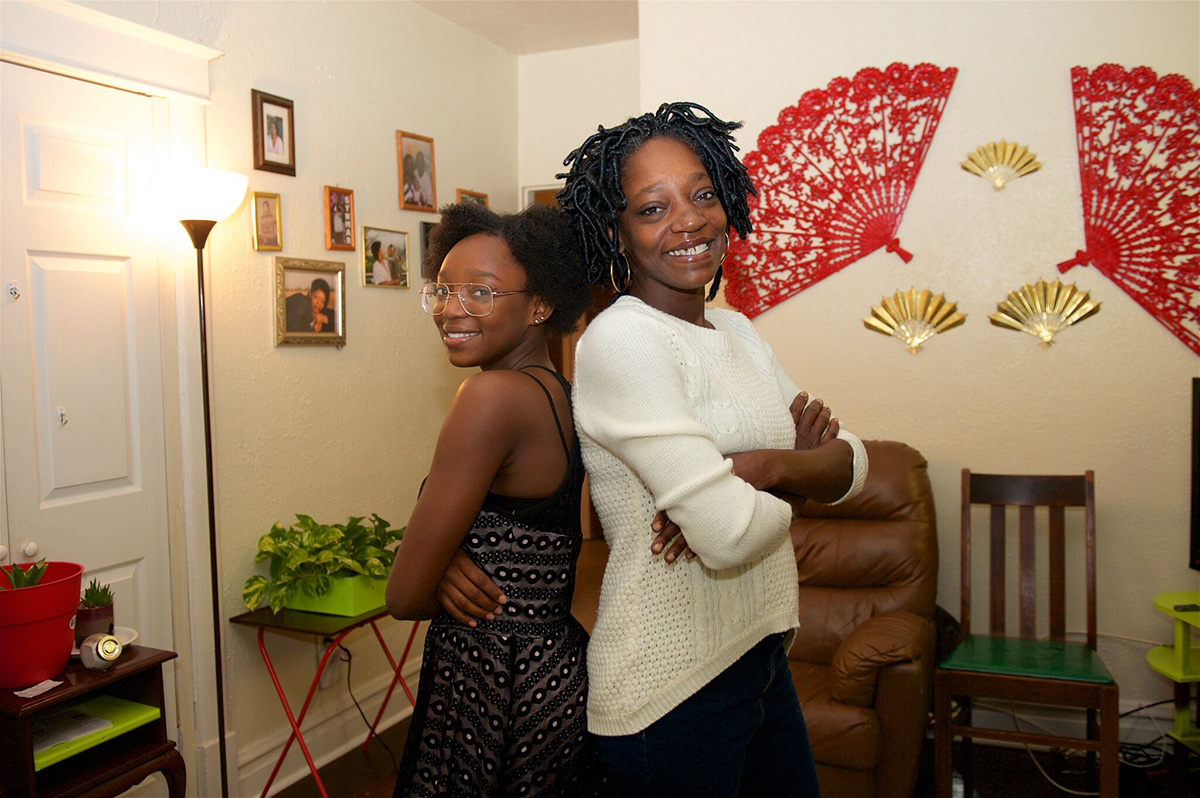
“Young people who have caring responsibilities are at a high risk for depression, anxiety, and issues of self-harm,” says Dr. Feylyn Lewis, an American scholar and research fellow at the University of Sussex in England. “They also are at a much higher risk of bullying if the parent or person they’re caring for has a stigmatized condition like HIV/AIDS, mental illness, or a visible disability.”
Older-teen carers who’ve participated in Lewis’s studies in the US and the UK consistently state two needs: “The first thing is money,” she shares with a laugh. “But second to that, they wanted someone they can talk to.”
Synmar has had elders – “both my aunts in Texas, my aunt that lives in Columbia… and my school counselor,” the teen says – to share her family care situation with. But up until a couple years ago, there hadn’t been anyone within her and her mother’s intentionally small church and school circles focused solely on Synmar’s needs as an individual.
Recognizing the benefits more support could give her child, Kimmie – with strong encouragement from trusted Marian faculty and staff – eventually decided to sign Synmar up for a Big Sister through Big Brothers Big Sisters of Eastern Missouri (BBBSEMO).
It was no easy choice.
“Originally, I didn’t want to do it because I didn’t want to bring a stranger who might hurt her into her life,” says Kimmie, whose own childhood and adolescence were marred profoundly by abusive adults.
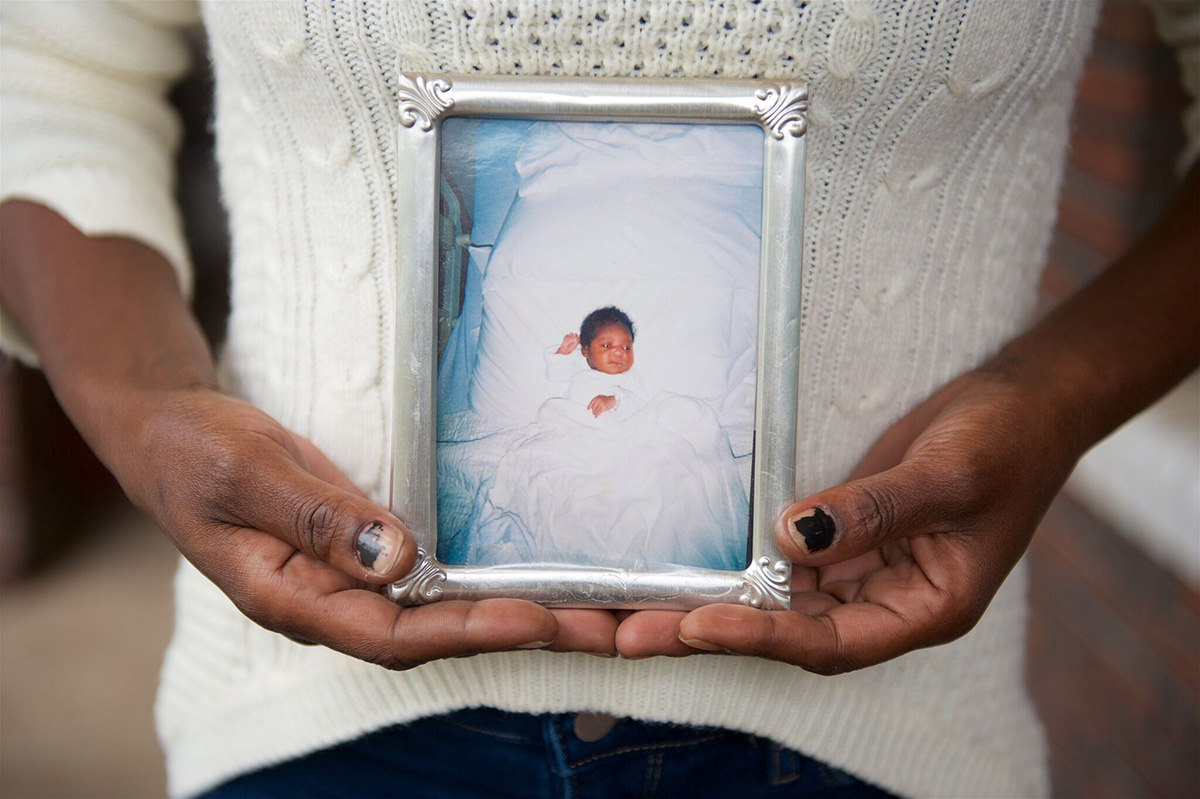
“But I have so many physical and mental health issues, and there are times I’m not able to be there for her the way I really want to be. So when Synmar said, ‘I want to do it,’ I finally said yes.”
Kimmie says enrolling her daughter in the program is “one of the best things I’ve done in my life.” It’s just one example of how hard she works, particularly as a parent and adult with mental health struggles, to ensure that Synmar receives social and emotional care all while giving the same care to her mother.
The deep bond that’s developed between Synmar and her Big Sister Lauren over the last two-and-a-half years shows how impactful an open, receptive ear can be for a young person juggling caregiving with all the “regular” stuff of teen life.
In fact, shortly after Synmar and Lauren were matched, Kimmie was hospitalized for an extended period.
“When my Big Sister Lauren came it was just like a weight had been lifted off my shoulders,” Synmar recalls. “Lauren took my mind off it and put my mind on other things and kept me busy. She helped me cope, and told me that I don't have to be strong all the time... and it's okay to cry sometimes.”
“I feel like Lauren and I have a very close connection. I can talk to her about things that maybe I can’t with my mom. She's helped me in really figuring myself out, what I like, and that I don't have to be like everybody else.”
“She made me feel more comfortable in my own skin,” Synmar says, “so when I’d be at school or something, it wouldn’t bother me what people would say, I would just still be me.”
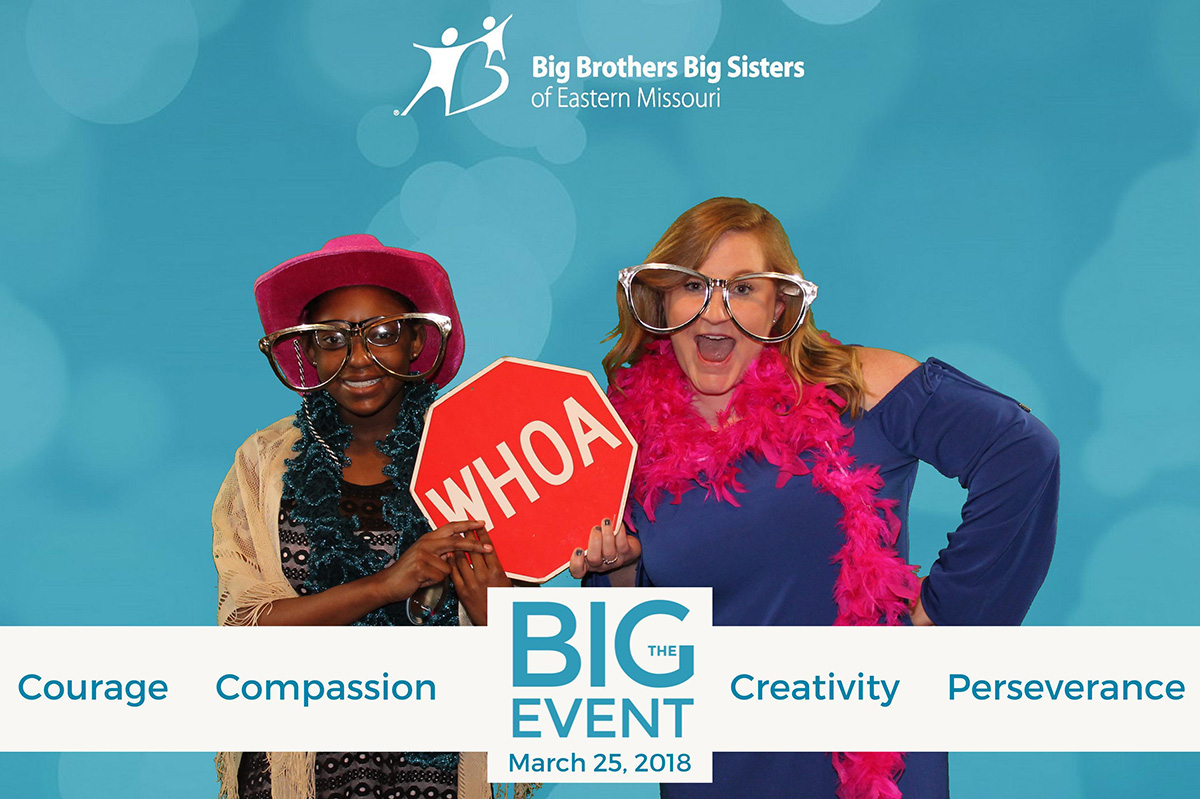
Little Sister Synmar and Big Sister Lauren / Photo by Tap Snap Photo Booth
So in many respects, Synmar’s really no different from other youth her age. She finds it easier to discuss certain topics, and work through doubts and insecurities, with someone who’s not a relative (and also not Mom). She’s nervously excited about changes to come with new people and a new school. She likes cartoons, getting dressed up, and taking trips to the mall even as she wishes she could do that with her mother.
And while this teen caregiver realizes her circumstances aren’t typical, she doesn’t see herself as special, or “a sad case,” as she puts it, because of them.
“The things my mom has to go through don’t drag me down or hold me back. What they do is give me a reason to push harder, in life and in school, and make her happier so she won’t worry so much about the issues she’s having.”
“Getting to experience a lot of things [like I have with my mom, I] feel more mature,” Synmar says, “and knowing that I can go through these things makes me feel good… like I’m stronger than average 13-year-olds. And it makes me feel more able to conquer a lot of things I never thought I could.”
Big Sister Lauren couldn’t agree more.
“Synmar’s an ordinary teenage girl: she struggles with homework and wanting to hang out instead of doing work, she has a cool group of friends that have a lot of fun goofing off, and she loves Justin Bieber,” Lauren says.
“But she’s extraordinary because of her upbringing. It’s been tough, and made her really resilient and strong. Synmar is there for her mom in everyday little things she maybe doesn’t even realize are second-nature. Like bringing leftovers home for Kimmie,” says Lauren, “or asking about what type of gift to get her mom for her birthday or Christmas or stuff like that. Her empathy is something that just astonishes me all the time. I say all the time that I learn just as much from her as she does from me.”
“And Synmar’s just so smart and witty,” Lauren adds. “She has the funniest little comebacks and sayings, and I will laugh so hard. She is such an awesome kid… you better watch out, because Synmar’s coming for ya,” says Lauren. “And you know? The world isn’t ready for her, but they need her. She’s incredible.”
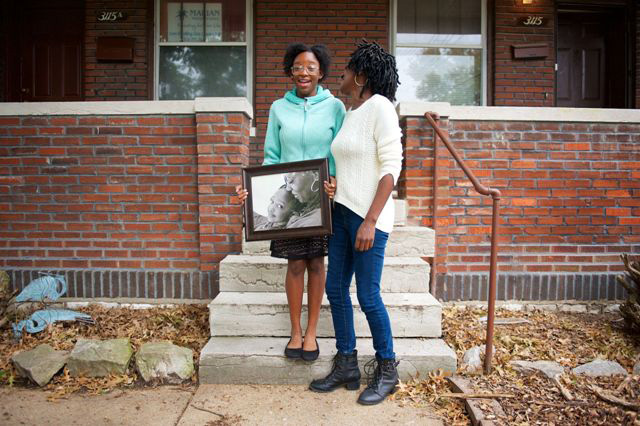
This story, produced in collaboration with Humans of St. Louis, focuses on LS Synmar and an aspect of mental wellness that goes under the radar: how youth often provide critical support for a parent’s or close family member’s health. It also highlights how valuable someone like a Big Sister or Big Brother can be in the life of a developing young person, caregiver or not.
Interested in learning how to grow and learn with a Little yourself? Contact Ericka Sanders, Volunteer Recruitment Manager, at esanders@bbbsemo.org or (314) 615-1041; or visit our volunteer page for more information.
For more of Synmar and Kimmie's stories, click this link.
Share

